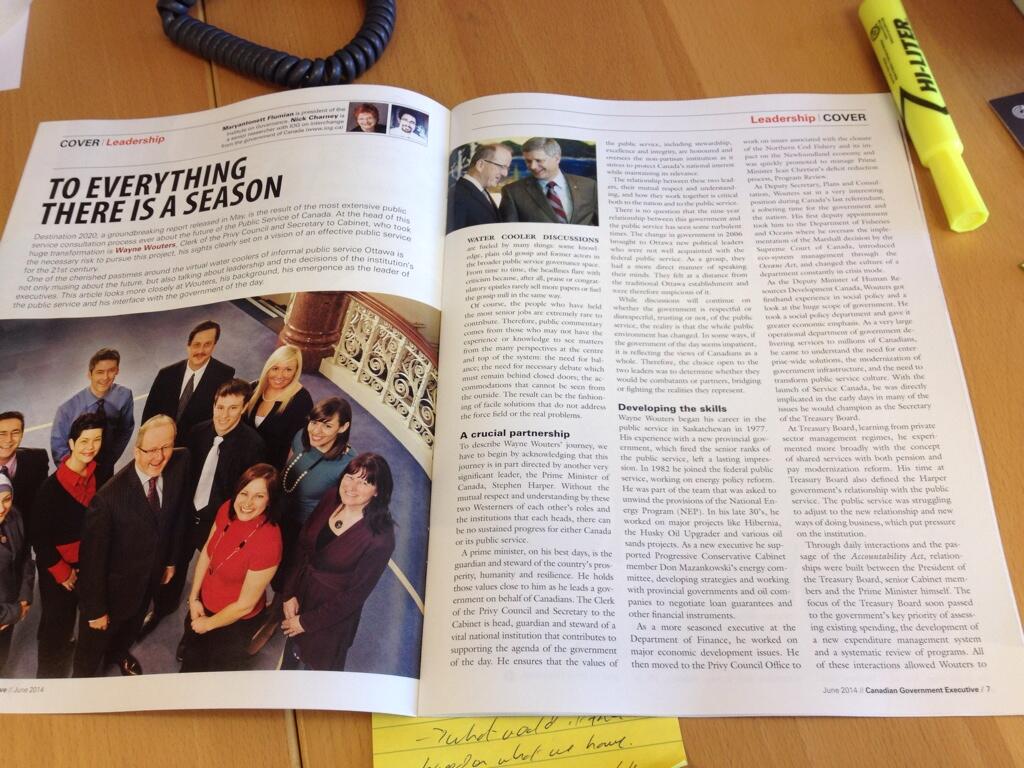| by Tariq Piracha |    |
Having conversations over the past couple of months with other public servants, it struck me that I don’t think that I’ve ever sat back and thought about the public service as an ideology. But the more conversations I have about Blueprint 2020 or any past public service renewal initiative, the more I’m starting to believe that this is the case.
We tend to think about ideology as large ideas like democracy, communism, socialism, capitalism, religion. Any ideology, whatever it is, guides any population that identifies with it on how to act and how to make decisions. In some cases it will be large and mostly academic like the ideologies listed above. In other cases, it may be much more personal or agenda-driven. Their scope may also be somewhere in between.
I’m seeing hints of ideology in the conversations around the public service, both academic and at the operational level: Who public servants ought to be; what public servants ought to be doing; the direction in which the public service should be going. The most recent and trending examples would be open government, open data and digital engagement — these are all marinating in a particular ideology that guides not only the direction that the public service ought to go, but also conditions the way in which we conduct our business.
I'm not attributing any positive or negative values to open government, or any ideology for that matter. My point is this: the public service has an ideology.
There’s a grey area that exists between the public service and government. The public service is tasked with preserving the public good, giving advice, implementing policy and serving Canadians. But the public service, despite its supposed impartiality, does not exist in a vacuum.
When the public service was created, it had a narrow purpose: support the mandate of the government. Public Works was one such department that was created in 1841 to build roads, bridges, canals. It provided infrastructure support in a country that in its infancy required significant support and momentum-building.
But the public service has grown way beyond those imaginings, or mandate around the time of Confederation. It has certainly grown beyond the imaginings of any one politician. Yes, government determines mandate, but there are pressures that exist in Canada that no one person (or politician) can manage on their own. (Even in Sir John A Macdonald's time, and despite his best efforts, he couldn't manage everything.) In that sense, the public service is not just responsive to government, it has become responsive to, or feels a responsibility toward the public good; to Canadians.
But if that’s the case, the values under which the public service operates are multi-faceted. Add in the organizational principles or trends that influence to the public service like groupthink, New Public Management, bureaucratic politics, and we’re now looking at a very complex public service that is trying to walk a tightrope of competing and sometimes confusing values.
One way in which Blueprint 2020 differs from previous renewal initiatives is that it asks about a vision for the public service in 2020. It is unfortunate that the conversations around Blueprint 2020 are often not about a vision for 2020. From what I have seen, the conversations are revolving around functionality, technology, effectiveness, efficiency.
Nick has already made the same kind of argument (see: The Question Blueprint 2020 Should Have Asked But Didn’t) that the conversations are less about a vision for 2020 and more reflective of a desire to catch up and keep up. I’ve seen few, if any, conversations about vision, values and ideology that the catching up and keeping up are couched in.
While I don’t think everyone should stop what they’re doing, book a boardroom and explore their feelings, I do believe a conversation about the nature and values of the public service is important. (See: Collaboration is about shared values.)
It’s the proverbial cart before the horse—talking about what to change before talking about the values and vision that could or should guide those decisions. I wouldn’t go so far as to say that public service ideology is an elephant in the room—I don’t think people are avoiding it. I think most simply haven't thought about it.
And we may not all be on the same page.







